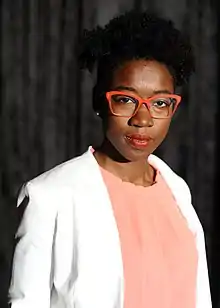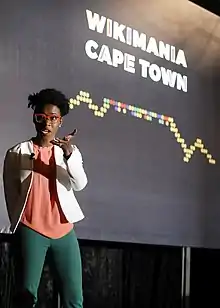Joy Buolamwini
Joy Adowaa Buolamwini is a Ghanaian-American computer scientist and digital activist based at the MIT Media Lab. She founded the Algorithmic Justice League, an organisation that looks to challenge bias in decision making software.[2]
Joy Buolamwini | |
|---|---|
 | |
| Born | 1989/1990 (age 30–31) |
| Education | Georgia Institute of Technology (BS) Jesus College, Oxford (MS) Massachusetts Institute of Technology (MS) |
| Known for | Algorithmic Justice |
| Awards | Rhodes Scholarship Fulbright Fellow |
| Scientific career | |
| Fields | Computer science Algorithmic bias |
| Institutions | MIT Media Lab |
| Thesis | Gender shades : intersectional phenotypic and demographic evaluation of face datasets and gender classifiers (2017, Master's) |
| Doctoral advisor | Ethan Zuckerman[1] |
| Website | www |
Early life and education
Buolamwini was born in Edmonton, Alberta, grew up in Mississippi and attended Cordova High School.[3] At age 9, she was inspired by Kismet, the MIT robot, and taught herself XHTML, JavaScript and PHP.[4][5][6] She was a competitive pole vaulter.[7]
As an undergraduate, Buolamwini studied computer science at Georgia Institute of Technology, where she researched health informatics.[8] Buolamwini graduated as a Stamps President's Scholar from Georgia Tech in 2012,[9] and was the youngest finalist of the Georgia Tech InVenture Prize in 2009.[10]
Buolamwini is a Rhodes Scholar, a Fulbright fellow, a Stamps scholar, an Astronaut Scholar and an Anita Borg Institute scholar.[11] As a Rhodes Scholar, she studied learning and technology at Jesus College, Oxford.[12][13] During her scholarship she took part in the first formal Service Year, working on community focused projects.[13][14] She was awarded a Master's Degree from MIT in 2017 for research supervised by Ethan Zuckerman.[1]
Career and research
In 2011, she teamed with the Trachoma program at Carter Center, to develop an Android-based assessment system for Ethiopia and aid eradication of the disease worldwide.[15][5]

As a Fulbright fellow, in 2013 Buolamwini worked with local computer scientists in Zambia to empower Zambian youth to become technology creators.[16] On September 14, 2016 Buolamwini appeared at the White House summit on Computer Science for All.[17][18]
She is a researcher at the MIT Media Lab, where she identifies bias in algorithms and develops practices for accountability during their design;[19] at the lab, Buolamwini is a member of Ethan Zuckerman's Center for Civic Media group.[20][21] During her research, Buolamwini showed facial recognition systems 1,000 faces and asked them to identify whether faces were female or male, she found that software found it hard to identify dark-skinned women.[22][23] Her project, Gender Shades, has attracted significant media attention and become part of her MIT thesis.[1][24][25][26][27][28][29][30][31] Her 2018 paper Gender Shades: Intersectional Accuracy Disparities in Commercial Gender Classification,[32] prompted responses from IBM and Microsoft, who swiftly improved their software.[33][34] She also created the Aspire Mirror, a device that lets you see a reflection of yourself based on what inspires you.[35] Her program, Algorithmic Justice League, aims to highlight the bias in code that can lead to discrimination against underrepresented groups.[36] She has created two films, 'Code4Rights' and 'Algorithmic Justice League: Unmasking Bias'.[37][38] She is Chief Technology Officer for Techturized Inc, a haircare technology company.[8]
Buolamwini's research is cited as an influence for Google, Microsoft in addressing gender and race bias in their products and processes.[39]
Awards and recognition
In 2017, Buolamwini was awarded the grand prize in the professional category in the Search for Hidden Figures contest, tied to the release of the film Hidden Figures in December 2016.[40] The contest, sponsored by PepsiCo and 21st Century Fox, was intended to "help uncover the next generation of female leaders in science, technology, engineering and math," [41][42] and attracted 7,300 submissions from young women across the United States.[9]
Buolamwini delivered a TEDx talk at Beacon Street entitled How I'm fighting bias in algorithms.[43][44][45] In 2018 she appeared on TED Radio Hour.[46] She was featured on Amy Poehler's Smart Girls in 2018.[3] Fast Company magazine listed her as one of four "design heroes who are defending democracy online".[47] She was listed as one of BBC's 100 Women in 2018.[48] In 2018 she was featured among "America's Top 50 Women In Tech" by Forbes.[49]
In 2019, Buolamwini was listed in Fortune Magazine's 2019 list of the World's Greatest Leaders. The magazine also termed her "the conscience of the A.I. revolution".[50] She also made the inaugural Time 100 Next list in 2019.[51] In 2020, Joy Buolamwini featured in a Levi's woman empowerment campaign for 8 March International Women's Day.[52] She was also featured in the documentary Coded Bias.[53]
Personal life
Buolamwini has lived in Ghana; Barcelona, Spain; Oxford, United Kingdom; and in the U.S., Memphis, Tennessee and Atlanta, Georgia.[10]
References
- Buolamwini, Joy Adowaa (2017). Gender shades : intersectional phenotypic and demographic evaluation of face datasets and gender classifiers (PhD thesis). MIT. hdl:1721.1/114068. OCLC 1026503582.

- Joy Official website

- "The Future of Computer Science and Tech: 12 Young Women to Watch — Part 2". Amy Poehler’s Smart Girls. February 19, 2018. Retrieved March 24, 2018.
- "TechDrawl Interviews GT Stamps President's Scholar, Joy Buolamwini". Vimeo. Retrieved March 24, 2018.
- "Joy Buolamwini | TryComputing.org". www.trycomputing.org. Retrieved March 24, 2018.
- "Meet The Digital Activist That's Taking Human Prejudice Out of Our Machines". Bloomberg.com. June 26, 2017. Retrieved March 24, 2018.
- "CHS Pole Vaulting - Joy Buolamwini". vault.awardspace.com. Archived from the original on March 25, 2018. Retrieved March 24, 2018.
- "Tech Startup of The Week: Techturized Wins With Hair Care Company". Black Enterprise. March 15, 2013. Retrieved March 24, 2018.
- "Joy Buolamwini wins national contest for her work fighting bias in machine learning". MIT News. Retrieved March 24, 2018.
- "Rhodes Scholar Shows 'Compassion through Computation'". www.news.gatech.edu. Retrieved March 24, 2018.
- "Filmmakers Collaborative | Profile". filmmakerscollab.org. Retrieved March 24, 2018.
- Buolamwini, Joy Adowaa (2014). Increasing participation in graduate level computer science education : a case study of the Georgia Institute of Technology's master of computer science. bodleian.ox.ac.uk (MSc thesis). University of Oxford. OCLC 908967245.
- "Joy Buolamwini Profile". The Rhodes Project. Retrieved March 24, 2018.
- "Oxford Launchpad: Confessions of an Entrepreneur: Joy Buolamwini | Enterprising Oxford". www.eship.ox.ac.uk. Retrieved March 24, 2018.
- "Scholar Spotlight: Joy Buolamwini | Astronaut Scholarship Foundation". astronautscholarship.org. Retrieved March 24, 2018.
- ZamrizeMedia (April 28, 2013), Joy Buolamwini | Fulbright Fellow 2013 | Zambia, retrieved March 24, 2018
- Buolamwini, Joy (September 15, 2016). "#CSForAll Tribute to Seymour Papert". MIT MEDIA LAB. Retrieved March 24, 2018.
- Joy Buolamwini (September 15, 2016), Seymour Papert - #CSForAll Tribute - Joy Buolamwini, retrieved March 24, 2018
- "Project Overview ‹ Algorithmic Justice League – MIT Media Lab". MIT Media Lab. Retrieved March 24, 2018.
- "interview: joy buolamwini | MIT Admissions". mitadmissions.org. Retrieved March 24, 2018.
- "Group People ‹ Civic Media – MIT Media Lab". MIT Media Lab. Retrieved March 24, 2018.
- Olson, Parmy. "Racist, Sexist AI Could Be A Bigger Problem Than Lost Jobs". Forbes. Retrieved March 24, 2018.
- "Photo Algorithms ID White Men Fine—Black Women, Not So Much". WIRED. Retrieved March 24, 2018.
- Kleinman, Zoe (April 14, 2017). "Is artificial intelligence racist?". BBC News. Retrieved March 24, 2018.
- "Artificial Intelligence Can Be as Biased as Humans—But It Doesn't Have to Be | NOVA Next". NOVA Next. October 25, 2017. Retrieved March 24, 2018.
- Joy Buolamwini | Timnit Gebru. "Gender Shades". gendershades.org. Retrieved March 24, 2018.
- Lohr, Steve (February 9, 2018). "Facial Recognition Is Accurate, if You're a White Guy". The New York Times. ISSN 0362-4331. Retrieved March 24, 2018.
- "Facial recognition software is biased towards white men, researcher finds". The Verge. Retrieved March 24, 2018.
- "Facial-recognition technology works best if you're a white guy, study says". The Seattle Times. February 18, 2018. Retrieved March 24, 2018.
- "MIT Researcher: AI Has a Race Problem, and We Need to Fix It". Boston Magazine. February 23, 2018. Retrieved March 24, 2018.
- "Study demonstrates gender and skin-type bias in commercial artificial-intelligence systems - Tech Explorist". Tech Explorist. February 12, 2018. Retrieved March 24, 2018.
- Buolamwini, Joy (2018). "Gender shades: Intersectional accuracy disparities in commercial gender classification". Conference on Fairness, Accountability and Transparency. 81: 77–91 – via mir.press.
- "Mitigating Bias in Artificial Intelligence (AI) Models -- IBM Research". www.ibm.com. May 16, 2016. Retrieved March 24, 2018.
- "Gender Shades: Intersectional Accuracy Disparities in Commercial Gender Classification" (PDF). Proceedings of Machine Learning Research. 2018. Retrieved March 24, 2018.
- "Aspire Mirror". Aspire Mirror. Retrieved March 24, 2018.
- International, Youth Radio-- Youth Media (February 28, 2017). "A Search For 'Hidden Figures' Finds Joy". Huffington Post. Retrieved March 24, 2018.
- "Filmmakers Collaborative | Code4Rights". filmmakerscollab.org. Retrieved March 24, 2018.
- "Filmmakers Collaborative | Algorithmic Justice League: Unmasking Bias". filmmakerscollab.org. Retrieved March 24, 2018.
- Mar 2; Burt, 2020 | Chris (March 2, 2020). "Tech giants pressured to follow Google in removing gender labels from computer vision services". Biometric Update. Retrieved March 9, 2020.
- "Hidden No More: STEM Spotlight Shines On 'Hidden Figures' Like MIT's Joy Buolamwini". Youth Radio. February 27, 2017. Retrieved March 24, 2018.
- PepsiCo (January 12, 2017), Search for Hidden Figures Grand Prize Winner - Joy Buolamwini, retrieved March 24, 2018
- ""Hidden Figures" Inspires A Scholarship Contest For Minority STEM Aspirants". Fast Company. January 19, 2017. Retrieved March 24, 2018.
- "Speaker Joy Buolamwini: How I'm Fighting Bias in Algorithms". scholar.harvard.edu. Retrieved March 24, 2018.
- Buolamwini, Joy. "How I'm fighting bias in algorithms – MIT Media Lab". MIT Media Lab. Retrieved March 24, 2018.
- TED (March 29, 2017), How I'm fighting bias in algorithms | Joy Buolamwini, retrieved March 24, 2018
- Joy Buolamwini: How Does Facial Recognition Software See Skin Color?, retrieved March 24, 2018
- Schwab, Katharine, Meet 4 design heroes who are defending democracy online, Fast Company Magazine, retrieved July 21, 2018
- "BBC 100 Women 2018: Who is on the list?". BBC News. November 19, 2018. Retrieved November 21, 2018.
- "Anne Aaron". Forbes.
- "Joy Buolamwini". Fortune. Retrieved November 26, 2019.
- "TIME 100 Next 2019: Joy Buolamwini". Time. Retrieved December 16, 2019.
- "She's Rewriting the Code". Off The Cuff. Retrieved March 9, 2020.
- "New Documentary 'Coded Bias' Explores How Tech Can Be Racist And Sexist : Code Switch". NPR. Retrieved December 12, 2020.